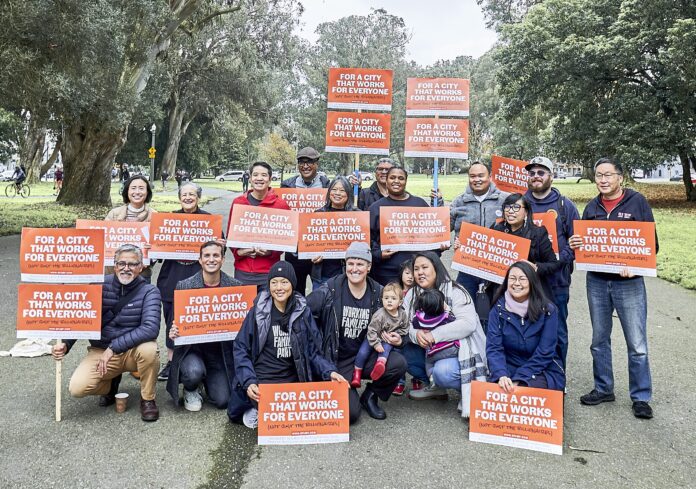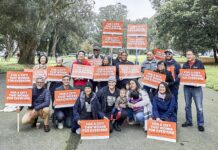San Francisco politics is facing a hostile takeover. A small group of billionaires, some of whom may not even live in the city, is trying to buy the local electoral system, and the next big battle is March 5.
They have formed a series of organizations—SF Together, GrowSF, Neighbors for a Better San Francisco, StopCrimeSF—that all trace their money back to a small handful of people who owe their wealth to tech and real estate.
There are no seriously contested primaries in San Francisco. Joe Biden will be the Democratic nominee for president, and the state Assembly and Senate seats are set (except for Assembly District 19, where Sup. Catherine Stefani is the overwhelming favorites).
But the billionaires know something: For the first time in decades, the race for mayor and Board of Supervisors, which could give them control of the city, will happen this fall, in a presidential election year, when a high number of people who don’t typically pay attention to local politics will go to the polls.
That means the endorsement of the Democratic Party will be critical—and a handful of low-profile races for the Democratic County Central Committee will determine who gets that endorsement.
So the plutocrats are pouring huge sums of money into electing a conservative slate to the DCCC. The mayor who they support has put on the ballot measures that have no real policy purpose or impact, but are designed to bring out right-wing voters.
If they succeed, they will next move to defeat progressive candidates for the Board of Supes in the fall, ensure that Mayor London Breed is re-elected, and quite possibly try to overturn district elections.
That would be a complete political coup, installing an oligarchy in control of City Hall.
This is not the first time big money has tried to buy San Francisco elections. But with district elections of supes, and public financing of local campaigns, independent and progressive candidates have been able to fend off the plutocrats with grassroots organizing.
Now the forces of Big Tech and Real Estate power, which seek to undermine business and land-use regulations, tenant protections, labor power, and progressive taxation, are making an effort not just to get their candidates elected but to restructure government to give the mayor more power and weaken the ability of grassroots candidates to win office.
The March 5 election is a dress rehearsal for the fall. That’s why it’s critical for local democracy that the plutocrats don’t win.
Our endorsements follow.
US Senate
Barbara Lee
A Democrat will win the election to fill the seat long held by the late Dianne Feinstein, and the frontrunner, with the Party establishment and support, is Rep. Adam Schiff. He would be a little more progressive than Feinstein, who was among the more conservative Democrats in Washington, and distinguished himself during the Trump impeachment proceedings.
Rep. Katie Porter, who has taken
on Big Pharma and Big Banks, is somewhat to Schiff’s left, and is raising three kids as a single mom. She’s an appealing candidate in many ways—but has also backed the Biden Administration policy on the Middle East and to some extent
on the border.
Barbara Lee, who has represented Oakland and Berkeley in Congress since 1990, is a completely different candidate: She was the only member of Congress to oppose the invasion of Iraq. She is one of the few Democrats to talk seriously about economic inequality, and has introduced legislation to impose a wealth tax on the very rich and to tax corporations that pay their CEOs more than 50 times what the median worker makes. She says that ICE is “rotten to the core.”
At 77, she says she would serve only one term in the Senate, and some argue that it’s better to elect a long-termer, who will gain the seniority to have more influence. But the US Senate needs a serious shakeup, and Lee would join Bernie Sanders as someone who actually cares about and will address economic inequality. Vote for her.
Judges
Superior Court Judge Seat 1
Michael Isaku Begart
Superior Court Judge Seat 13
Patrick Thompson
We have never taken the position that judges are somehow protected from democracy. For better or for worse, the position of Superior Court judge in California is an elective office, and anyone who is qualified and wants to run has
that right.
In this case, the challenge to two sitting judges comes from the right wing, from the same billionaire-funded groups that are trying to take over the city. They are accusing two completely qualified judges of not being touch enough on crime—and that’s a dangerous trend.
Most local elected officials
are supporting Begart and Thompson.
So far, the mayor is not. That’s an indication of how close she is linked to the looming oligarchy.
Begart and Thompson have been fair judges, who are following state law and policy on issues like pre-trial detention and sentencing. The smear campaigns against them are, frankly, not just inaccurate but distrurbing. We endorse both of them for another term.
State Assembly, District 17
No endorsement
State Assembly, District 19
No endorsement
State Senate
No endorsement
It’s sad that a progressive city like San Francisco is represented at the state Capitol by people who have bought entirely into the Yimby narrative and are undermining the future of working-class and low-income people in their own city.
State Sen. Scott Wiener has specifically used legislation to attack San Francisco’s ability to protect vulnerable communities from displacement. Assemblymember Matt Haney has gone along with the Wiener approach. Neither of them has done anything significant to bring to this city the state money that’s needed to meet the affordable housing mandates they have pushed.
Now that longtime Assemblymember Phil Ting is termed out, two serious candidates are seeking the West Side seat. Sup. Catherine Stefani has been among the most conservative members of the board. David Lee has given progressives no reason to support him.
The state Legislature is, sadly,
captive to Big Tech, Real Estate, Telecom, and other powerful business interests. None of the candidates from San Francisco give us any reason to believe they will be any different.
Democratic County Central Committee Labor and Working Families Slate
Assembly District 17
Peter Gallotta
Kristin Hardy
John Avalos
Jeremy Lee
Vick Chung
Patrick Bell
Gloria Berry
Adolfo Velasquez
Michael Nguyen
Sydney Simpson
Joshua Rudy Ochoa
Sal Rosselli
Jane Kim
Anita Martinez
Assembly District 19
Natalie Gee
Greg Hardeman
Frances Hsieh
Leah LaCroix
Connie Chan
Queena Chen
Sandra Lee Fewer
Mano Raju
Hene Kelley
Gordon Mar
The DCCC, which sets policy for the local Democratic Party, was once a pretty minor office. People who really cared about the party ran, and essentially volunteered to help register voters and build organizing efforts.
Then about 20 years ago, the state Supreme Court ruled the local party committees can issue endorsements of candidates in primaries and in general elections—and suddenly the DCCC mattered, a lot.
For all its obvious flaws, the Democratic Party claims a clear majority of the registered voters in this city, and when people get an official slate mailer from the party, it has significant influence.
That’s particularly true this year, when the Mayor’s Office and a potential majority on the Board of Supes will be on the November ballot—and the people who get elected to the DCCC will determine the party’s endorsements, not just this year but for the next four years.
Two slates are competing for control of the party. One of them is funded by the billionaires. The other is supported by most of organized labor and almost every progressive organization in town.
That’s a pretty easy call.
The Labor and Working Families Slate will endorse candidates and take stands on issues that challenge the power structure. This is not a minor deal; it’s critical. Vote carefully, it’s a long ballot; our recommendations are in order you will find them on the ballot.
State propositions
Proposition 1:
Mental health services
Yes
Everyone agrees the mental health service system in California is badly broken, and has been since Gov. Ronald Reagan shut down the state hospitals and county officials didn’t pick up the slack—and over time, as costs rose, state funding didn’t.
Prop. 1 is a small step that has the support of almost everyone in the health-care and mental health community. It would change the way state money is allocated, in some cases prioritizing housing, and includes a $6.3 billion bond act to build housing for veterans and homeless people and for mental health and drug treatment facilities.
We’re a bit worried that this measure will once again push responsibility for services from the state to local government—without the state providing the needed resources. But we’re willing to endorse it.
Local propositions
Aside from Prop. A, the affordable housing bond, most of the ballot measures in San Francisco are mayoral politics posing as public policy—and most of them are bad public policy.
Mayor London Breed looks terrible in the polls, so she’s trying to burnish her popularity the way others, including Gavin Newsom, have done—by attacking poor people and promoting the cops. In the process, she’s supporting ballot measures that, should they pass, will do at best no good and at worst a lot of harm.
Our recommendations:
Proposition A:
Affordable Housing Bond
YES
Prop. A would allow the city to issue $300 million in bonds for affordable housing. Much of that money—$240 million—would pay to construct housing for extremely and very-low-income people. Another $30 million would pay for housing for lower-income and moderate-income households, and $30 million would go for survivors or domestic violence, sexual abuse, human trafficking, and trauma related to living on the streets.
Nonprofits in the city could leverage that money to build as many as 1,500 units.
This is the first step in what could be a much larger deal: State and local officials are working on a potential $20 billion regional housing bond for the November ballot, which could have a huge impact, particularly since San Francisco is likely to get more than its proportional share since it has more unhoused people and has a nonprofit infrastructure more willing and able to build affordable housing. That’s critical if the city is to come anywhere close to funding the 46,000 units of affordable housing that the state is mandating, but has done little to fund, over the next seven years.
Prop. A doesn’t raise property taxes or rents. San Francisco generally doesn’t issue new bonds until it pays of old ones, since new bond debt means property tax hikes—and landlords are allowed to pass half of that onto renters.
We’d love to see a much, much larger housing bond—but right now, bonds need a two-thirds voter majority, which is difficult even in the best circumstances, and right now, polls show the voters are not happy with giving more money to the government.
The state Legislature is also working on a measure that would lower the threshold for housing bonds to 55 percent, and that will likely be on the November ballot, which will make this process a lot easier in the future. The reality is that most property owners, including the big commercial property owners who would pay the bulk of any tax hike, have done very well under Prop. 13 and can well afford a modest increase in their annual levies. And the supes could simply vote not to allow residential landlords to pass that along to their tenants.
But right now, this needs every
possible progressive vote, and turnout
will be key. We are happy to recommend Yes on A.
continued on mext page
Proposition B:
Police Staffing
NO
This is a weird one: Sup. Matt Dorsey tried to get the board to put a City Charter amendment on the ballot that would mandate a minimum of 2,300 police officers. That would require the city to cut, perhaps deeply, into other public-safety programs (the 911 call center is badly understaffed, as is SF General Hospital). Dorsey offered no new revenue and no program tradeoffs; he just wants more cops, as if that’s the only solution to public-safety problems.
Labor, particularly the city employee unions, were aghast—they saw this as what it was, a direct attack on every city program that isn’t armed police officers. A lot of the other supes were opposed for basic policy reasons: The size of the police force doesn’t belong in the City Charter.
So labor and Sup. Ahsha Safai, who is running for mayor, cut a deal: Safai amended the ordinance to say that San Francisco needs 2,300 cops—but only when the city finds a way to pay for them.
Dorsey then opposed and is campaigning against his own measure, calling it a “cop tax.” But labor, having won an acceptable compromise, is going all out to pass it—even though it’s still bad public policy.
The mayor could put the money for 2,300 cops in the budget if she wanted, and the supes could approve it—if they had the money or were willing to cut other programs. This is silly; it puts a mandate that may not make sense next year, or the year after, or in the future, into the city’s Constitution.
We get why labor is supporting this, but we’re not. Vote no on B.
Proposition C:
Transfer tax exemption
NO
Prop. C almost certainly won’t do what it’s supposed to do—encourage more commercial landlords to turn offices into housing. It might wind up costing the city some money.
But the important part of Prop. C has gone largely unnoticed: It’s an attempt to undermine the voters and cut the transfer taxes for high-end real estate sales that are supposed to fund affordable housing.
Under state law, cities are pretty limited in their ability to tax the rich. But one thing that is flexible is the tax that the city charges every time a piece of real estate changes hands. It’s called the transfer tax, and in most counties, it’s pretty minimal.
In San Francisco, the voters have twice agreed to raise it—but just on properties worth $5 million or $10 million. The first tax hike, Prop. W, brought in money to make City College free for SF residents, among other things. The second hike, Prop. I, sponsored by Sup. Dean Preston, has brought in a total of close to $500 million for affordable housing (although the mayor has refused to spend it as the voters intended).
Only very wealthy individuals who are buying houses worth more than $5 million and the corporations that own high-end commercial real estate pay it, and only when the property is sold.
On the surface, Prop. C would exempt from the higher taxes buildings that are converted for office to housing and then sold. That won’t make much difference; converting offices to housing is a very expensive proposition, and the relatively small amount of money that the developer might have to pay later in transfer taxes won’t make the difference between going forward or not.
But there’s a poison pill in here: Prop. C would allow the supervisors, by a simple majority vote, overturn the voter-approved tax hikes. Supporters are hoping a more conservative board gets elected, so the big property owners can get a windfall at the expense of City College and affordable housing.
Vote no.
Proposition D:
Ethics laws
YES
The Ethics Commission put Prop. D on the ballot in an effort to address some elements of the city’s ongoing bribery and corruption scandal. It tightens the definition of “bribery” to include “ soliciting or accepting anything of value for themselves or a third party with the goal of influencing any government action. It would also prohibit anyone from offering a bribe to City officers and employees, including payments to third parties,” the ballot simplification statement says.
It also mandates greater disclosure of gifts and professional relationships.
It’s a modest step forward on a very serious problem. Vote yes.
Proposition E:
Police procedures
NO
This measure is on the ballot for two reasons: Mayor London Breed is unhappy with her own appointee to the Police Commission—and she wants to make it look like she’s tough on crime.
The measure would override the commission, which had voted for sensible policies for things like high-speed chases, use of force, and police surveillance. Although Breed appoints four of the seven members, one of the people she put on the panel, Max Carter-Oberstone, has turned out to be not only an excellent commissioner (who clearly has a political future in this town) but a strong advocate for police reform and accountability. He hasn’t voted the way Breed wants, and she tried to force him to resign—but legally she can’t.
So: Prop. E.
Specifically, the measure would allow more high-speed chases (yes, on the narrow streets of SF, where they frequently lead to injuries and sometimes deaths); give the cops far more authority to spy on San Franciscans without oversight (including with drones); and reduce the reporting requirements for use of force incidents (which provides the data showing the radical racial disparities in use of force).
On a broader level, this is an attempt to undermine the authority of a city commission and give the mayor more power.
Vote no.
Proposition F:
Drug testing welfare recipients
NO
Again: This measure makes no sense as public policy. For starters, it’s impossible to implement—the city has nowhere near the money to provide the social workers and counselors to screen the 5,200 people who get welfare in San Francisco, and nowhere near the money to provide free treatment to people who are willing to accept it. (There’s nowhere near enough available treatment today for people who are actively seeking help.)
If it actually took effect, it could cause hundreds, maybe thousands of people to lose their housing and their modest income, deeply increasing homelessness, dire poverty, and crime.
This is nothing but a politically motivated attack on the poor by a mayor who thinks it will boost her popularity. It’s disgusting.
Vote no.
Proposition G:
Algebra for eighth graders
NO
Why is this even on the ballot? It’s a statement of policy that has no actual impact on school policy, which is set by the elected School Board. It’s addressing a problem that the board is already solving: The superintendent just put forward three proposals to offer algebra in middle school, and the board is going to approve one of them.
There’s national data that shows that separating students into what amounts to honors math and general math in eighth grade tends to increase racial disparities in math learning. There’s some new data that suggests the opposite. There’s a reason San Francisco has an elected School Board and a professional superintendent who can evaluate that data and make informed decisions.
We have no problem with eight graders learning algebra, which makes it easier for students to complete calculus in high school (although it didn’t work for our editor, who flunked that advanced class in 12th grade but passed it in college, when some folks are more ready for this level of math) and if the data shows this is a best practice, the board should pursue it.
But that’s already happening. This is just political posturing. Vote No.




